

Franco’s Invisible Legacy. It’s exactly 80 years since the end of the Spanish Civil War, when General Francisco Franco’s populist forces finally overcame the leftist resistance and plunged the country into full-blown dictatorship.
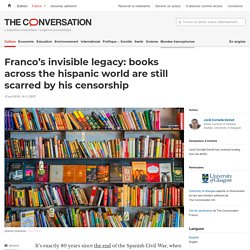
Decades after his death, Franco continues to cast a long shadow over Spain, from the rise of the far-right Vox party to the hundreds of mass graves of people who died in the war that are still waiting to be exhumed. One other hugely important legacy that few people are aware of is the continuing effect on books, both in Spain and throughout the Spanish-speaking world. To this day, translations of many world classics and works of Spanish literature are being reprinted using expurgated texts approved by the dictator’s censors – often without publishers even realising it, let alone readers. Siete logros del 15-M, siete años después. La música del 15M. En Portada.
RFD 2017 BCN. Barcelona vuelve a crear empleo (precario) Trabajo: Cada puesto de trabajo creado en 2018 obligó a firmar 43 contratos. David Harvey: «El Neoliberalismo es un Proyecto Político» La movida madrileña en 7 minutos. Esto no es una manifestación – Acciones, construcciones y giros revolucionarios para salvar el mundo. Spain’s Micro-Utopias: The 15M Movement and its Prototypes - Guerrilla Translation! Image: Voces con Futura “The old protests, so dull and single-minded, have passed into obsolescence, and given rise to infinite possibility.
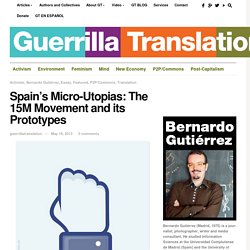
We’ve rethought the concepts of action, protest, relationship, the public, the common…” In the collective text, This is Not a Demostration, we find a hidden corner of thoughtfulness completely ignored by mass media. Zinn WhyStudyHistoryEDITED. No hay fracaso si hay balance: poder y potencia en el ciclo 15M-Podemos. Letter from Catalonia: Barcelona’s Occupy Mayor Wins a Second Term. Three weeks after appearing to lose her re-election bid, Barcelona’s leftist mayor Ada Colau won another four-year term Saturday.
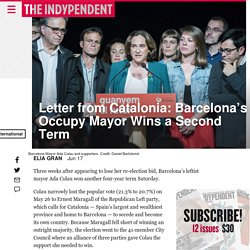
Colau narrowly lost the popular vote (21.3% to 20.7%) on May 26 to Ernest Maragall of the Republican Left party, which calls for Catalonia — Spain’s largest and wealthiest province and home to Barcelona — to secede and become its own country. Because Maragall fell short of winning an outright majority, the election went to the 41-member City Council where an alliance of three parties gave Colau the support she needed to win. In addition to receiving 10 votes from Barcelona en Comú, the party she leads, Colau cobbled together a majority by receiving eight votes from the Socialists and three from the conservative pro-European Union party of Manuel Valls.
Both Valls and the Socialists oppose Catalonian independence. Colau has refused to support or oppose the secessionist movement while criticizing the Spanish government’s crackdown on its leaders. “El discurso político español actual considera peligrosos por igual a nacionalismos, populismos y feminismos por su 'exceso' de emoción” In a Polarized Spain, Voters Give the Socialists Another Chance.
Hunched over the podium with her head in her hands, Irene Montero found herself in disbelief.
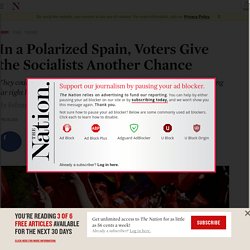
Montero, the leading congressional candidate for Unidas Podemos, was participating in the first of several national debates in the run-up to Spain’s snap general elections, which took place on Sunday. She had just witnessed Cayetana Álvarez de Toledo, a Spanish aristocrat and leading congressional candidate for the conservative Partido Popular (PP), pull out all the stops to criticize a law on gender violence and affirmative consent proposed by the Spanish left. The law, Álvarez said, “turned the cause for women into a confrontation between women and men.” She added, “Do you really go around saying, ‘yes, yes, yes’ all the way through till the end?” Los 30.000 niños robados del Franquismo - El Salto. Time to Bury the Dead. Interview by Tommy Greene Eoghan Gilmartin.
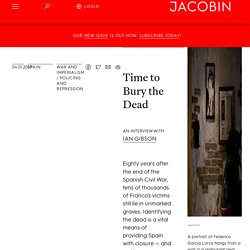
Institución Fernando el Católico - Ver publicación. Pablo Iglesias: Understanding Podemos. New Left Review 93, May-June 2015. New Left Review 93, May-June 2015 pablo iglesias The explosion of the 2008 financial crisis has produced a series of unforeseen political consequences, in Europe in particular.
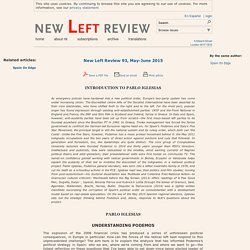
How can the forces of the radical left best respond to this unprecedented challenge? The aim here is to explain the analysis that has informed Podemos’s political strategy in Spain: who we are, where we’re coming from and where we want to go—the fullest reflection on these questions that I’ve been able to set down since being elected leader of Podemos last November. It’s also an opportunity to speak in my own voice, outside the format of mainstream media interviews. Otra Vuelta de Tuerka - Pablo Iglesias con Manuel Castells (Programa Completo) NPR Choice page. Spain’s Radical Right Is Here to Stay—but Did It Ever Leave? “We have come here to call out those who are responsible for Spain’s disunion and downfall—and to engage them in combat.”
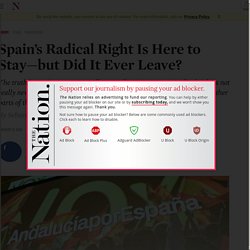
Santiago Abascal’s call to arms was meant to reassure some 10,000 flag-waving supporters who had gathered at an old bullring in Madrid on October 7. Less than two years earlier, that old bullring, Vistalegre, had welcomed the Citizen Assembly of Podemos, the left-wing, anti-austerity party helmed by Pablo Iglesias. But this time it hosted Vox, Spain’s newest right-wing party. La extraña vida póstuma de un inmueble madrileño y otras historias de la Guerra Civil. Almodovar-Backed ‘The Silence of Others’ Gets International Trailer. Barcelona’s Experiment in Radical Democracy. Barcelona City Hall looks like it’s been occupied by protesters.
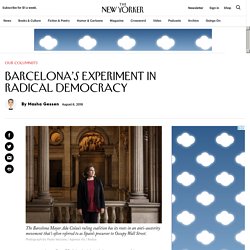
A banner over the entrance to the fourteenth-century building reads, in Catalan, “Free Political Prisoners”—a reference to Catalan pro-independence activists, some of whom have been prosecuted while others were forced into exile by the national government in Madrid. The banner was placed here by the city government, which is indeed run by protesters: the ruling coalition of Mayor Ada Colau has its roots in the Indignados, the anti-austerity movement that’s often referred to as Spain’s precursor to Occupy Wall Street. Postwar Spain: America’s shameful rapprochement to the Franco dictatorship. On December 6, 1947, the military attaché at the Spanish Embassy in Washington DC sent an encrypted telegram back to Spain’s Central General Staff.
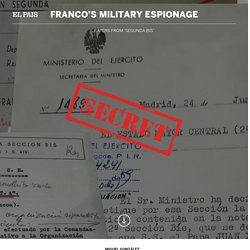
The decoded message read as follows: “The current three [in the US Army] received reply to memorandum directed jointly by Army and Navy to State [Department] regarding the need to radically and urgently improve relations with Spain [...]. In the highly secret document, the State [department] says literally: relations with Spain in all their aspects will be normalized quickly without a sound or statements to the press. Spanish government approves exhumation of Francisco Franco. Spain has taken another step towards dealing with the legacy of the civil war after the government approved the exhumation of the remains of Francisco Franco, which have lain in the Valley of the Fallen mausoleum near Madrid since his death in 1975.
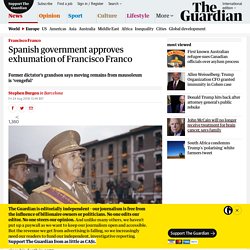
The council of ministers voted in favour of the move, which was opposed by the rightwing People’s and Citizens parties. However, the decree only needed a simple majority to pass. The Socialist party of the prime minister, Pedro Sánchez, the leftwing Podemos and the Catalan and Basque nationalist parties all voted in favour. Barcelona’s Experiment in Radical Democracy. Del hedonismo triste al decrecimiento feliz: hacia una imaginación política de la empatía. Orígenes e historia. Lengua catalana. Franco: a spectre from the past in Spain. A little over 40 years ago, on the 20th November 1975, General Francisco Franco died of natural causes in Madrid, just as he was about to celebrate his 83rd birthday. By that time he had been for almost 40 years, from October 1st, 1936, the head of a dictatorial regime with the title of ‘Caudillo of Spain by the Grace of God’.
The word “Caudillo” (Leader) was not mere flattery, quite the contrary. It was the legal formula to define the supreme political authority and main institutional office he held during his entire life as a dictator. Franco: a spectre from the past in Spain. Represión: "España es un estado de excepción": el yo acuso de los investigadores en el exilio. Interview: Adam Hochschild, Author Of 'Spain In Our Hearts' Italian troops take part in a Nationalist victory parade in Madrid on May 19, 1939. Military aide from Italian dictator Benito Mussolini helped Gen.
Francisco Franco win the Spanish Civil War. Len Putnam/Associated Press hide caption toggle caption Len Putnam/Associated Press. Catalonia Independence Crisis Intensifies Spain's Political Divide. Political parties in Spain are struggling to navigate an increasingly polarized political landscape, says Professor Sebastiaan Faber of Oberlin College biography Sebastiaan Faber, Professor of Hispanic Studies at Oberlin College. Author, most recently, of the book Memory Battles of the Spanish Civil War, and co-author of the Nation article "Catalonia's Elections Take Spain Back to Square One.
" The scars of Catalonia. A DIARY OF THE NEW SPAIN. Rubiopueyo eng. Spain’s Conflict Over Catalonia Is Covering Up Massive Political Corruption. Catalonia crisis: Lawmakers vote to split from Spain - CNN. A Way Out for Spain and Catalonia? Crackdown by Spain on Peaceful Voters Who Favor Catalonia Independence Recalls Franco Regime. Podemos, Catalonia and the workers’ movement in the Spanish state – International Socialism. Ellas mandan (distinto) Has Spain’s Podemos Party Squandered Its Prospects? Ada Colau: "Esta ciudad no será sostenible si no es capaz de reducir la desigualdad"
Barcelona impulsa un modelo de ciudad desde una perspectiva feminista — idealista/news. Illustrated timeline of the Spanish Civil War (in-depth) “La política represiva de la cúpula del Estado ha aumentado el apoyo al independentismo” Las nueve luchas sociales que agitaron el año. RENDUELES + SOLAS: Podemos And Political Change. Memory Politics: On ‘Franco’s Crypt’ Las raices internacionales del 99. Las Maestras de la República. Doce acciones inspiradoras para burlar la nueva Ley de Seguridad Ciudadana. Cuando la hora llega. Movimientos sociales, resistencia y lo que tiene que pasar para cambiar el mundo. Sí, pudieron. "Fighting the New Fascism: Juan Carlos Monedero on PODEMOS, Spain's New Political Force."
Spain: Platform of mortgage victims (PAH) – It is possible! Gala Pin, una ‘okupa’ en la Casa Gran. Spain - Yes, We Can! - Foreign Correspondent - ABC. Spanish Elections: Manuela Carmena and Ada Colau's Plans to Transform Spain's Two Biggest Cities. Interview with Colau on Democracy Now! Alcaldes de izquierda para 10,6 millones de ciudadanos. Joan Ramon Resina: "No hay que confundir la historia con la realidad" La piel y el teatro. Salir de la política. Oriol Nel·lo: "La visió del catalanisme conservador respecte Barcelona ha sigut molt negativa" Never Mind the Sharing Economy: Here’s Platform Capitalism. Spain: A Country With No Government. Neoliberalism Is a Political Project. On the Commons: A Public Interview with Massimo De Angelis and Stavros Stavrides. Lobo Suelto!: Entrevista con Jacques Rancière: potencias y problemas de una política del 99% // Amador Fernández-Savater. Win the city guide.
El Govern eligió la víspera de la victoria de Colau de entre 61 fechas para desalojar el Banc Expropiat. Could the Left Finally Win in Spain This June? Catalonia Independence Vote: How the Catalan Language Survived A Ban. Franco's Legacy Rattles Spain. La memoria histórica vuelve a los tribunales españoles. Judge Says Poor Have No Right To Clean Water, Allows Detroit Water Shutoffs To Continue. La clave está en Sol. Madrid y Barcelona lideran la desigualdad. Crackdowns on Free Speech Rise Across a Europe Wary of Terror.